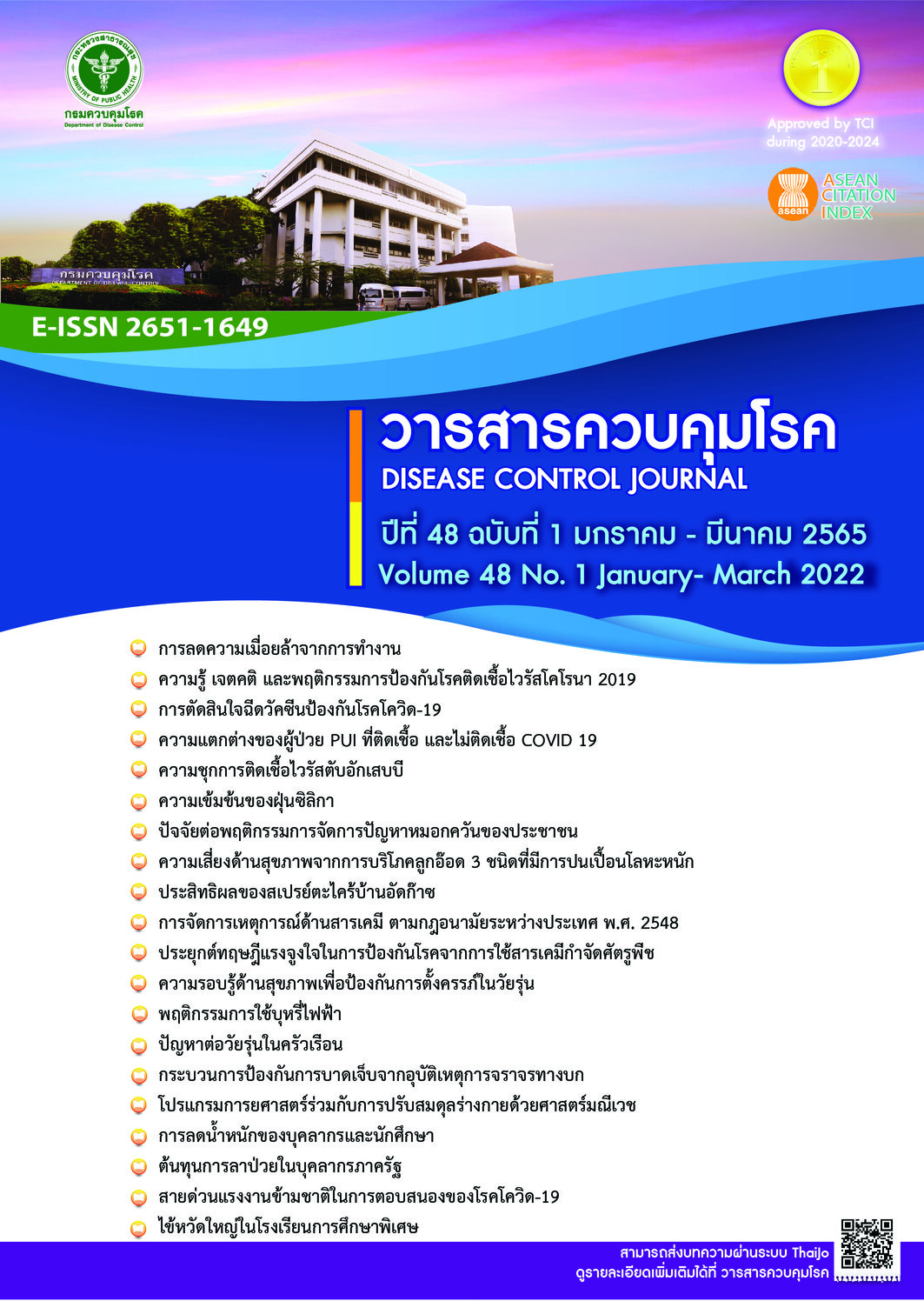Efficacy of lemongrass aerosol sprays against insecticide-resistant Aedes aegypti mosquitoes from dengue risk areas
DOI:
https://doi.org/10.14456/dcj.2022.9Keywords:
lemongrass aerosol spray, insecticide-resistant Aedes aegypti, dengue risk areasAbstract
An efficacy study of lemongrass aerosol spray against insecticide-resistant Aedes aegypti mosquitoes from dengue risk areas in Nakhon Pathom and Chanthaburi provinces was conducted through investigation. Lemongrass (Cymbopogon citratus) essential oil was extracted by hydrodistillation and its chemical composition was analyzed by Gas Chromatography-Mass Spectrometry (GC-MS). The oil was tested on susceptible Ae. aegypti mosquitoes to determine a discriminating concentration (2xLC99) and then tested against the insecticide-resistant mosquitoes by modification of the WHO insecticide susceptibility test. Lemongrass aerosol sprays were further developed and then studied for the efficacy against the insecticide-resistant mosquitoes in glass chamber and the fields. The results showed that the main constituents identified from the oil were geranial (28.77%) and neral (22.74%). The discriminating concentration of the oil was set at 0.814% that provided a 100% mortality rate for the insecticide-resistant mosquitoes. Lemongrass aerosol sprays containing the oil concentrations of 0.814%, 4.07%, 8.14% and 8.14% with flavoring agents gave the mortality rates of 0%, 30-40%, 100% and 100% for the insecticide-resistant mosquitoes from both provinces in glass chamber, respectively. The aerosol sprays containing the oil concentrations of 8.14% and 8.14% with flavoring agents provided the 100% mortality rate for Ae. aegypti mosquitoes in the fields of both provinces at 24 hours. In conclusion, the lemongrass aerosol sprays containing the oil concentrations of 8.14% and 8.14% with flavoring agents were effective against the insecticide-resistant Ae. aegypti mosquitoes from dengue risk areas of both provinces. It suggests that the lemongrass aerosol sprays could be alternative products to chemical aerosol sprays for mosquito control purpose.
Downloads
References
World Health Organization. Dengue and severe dengue [internet]. [cited 2020 Dec 9]. Available from: https://www.who.int/en/news-room/fact-sheets/detail/dengue-and-severe-dengue
Limkittikul K, Brett J, L'Azou M. Epidemiological Trends of Dengue Disease in Thailand (2000–2011): A Systematic Literature Review. PLoS Negl Trop Dis. 2014;8(11):e3241.
Division of Vector-Borne Diseases Control, Department of Disease Control (TH). Report situation of dengue fever 2020 [internet]. [cited 2021 Jan 11]. Available from: https://drive.google.com/drive/folders/1TTaSvaYYamVwA5Ig7ATZJmIcHBuGXOSb.pdf (in Thai)
Division of Epidemiology, Department of Disease Control (TH). Reporting of Priority Diseases Guideline. Bangkok: The Agricultural Co-operative Federation of Thailand; 2012. (in Thai)
Division of Vector borne Diseases, Department of Disease Control (TH). Reporting of Insecticide Susceptibility in Mosquito Vectors [internet]. [cited 2020 Dec 10]. Available from: https://drive.google.com/drive/folders/1Kzxz3iEgyAzNpIDSEWJ0QTy_eVoS7FJY (in Thai)
Phasomkusolsil S, Soonwera M. Efficacy of herbal essential oils as insecticide against Aedes aegypti (Linn.), Culex quinquefasciatus (Say) and Anopheles dirus (Peyton and Harrison). Southeast Asian J Trop Med Public Health. 2011;42(5):1083-92.
Sri-ard B. Preliminary research. 3rd ed. Bangkok: Suweriyasan; 1992
World Health Organization. Monitoring and managing insecticide resistance in Aedes mosquito populations: Interim guidance for entomologists. Geneva: World Health Organization; 2016.
Wiley 7N Edition (Agilent Part No. G1035B): Wiley Registry of Mass Spectral Data, 7th Edition [internet]. [cited 2022 Mar 4]. Available from: https://www.agilent.com/cs/library/technicaloverviews/Public/5967-5807E.pdf
Adams RP. Identification of essential oil components by gas chromatography, quadrupole mass spectroscopy. 4th ed. Carol Stream Illinois: Allured Pub Corporation; 2001.
Abbott WS. A method of computing the effectiveness of an insecticide. J Econ Entomol 1925;18:265–7.
Tak JH, Isman MB. Metabolism of citral, the major constituent of lemongrass oil, in the cabbage looper, Trichoplusia ni, and effects of enzyme inhibitors on toxicity and metabolism. Pestic Biochem Physiol. 2016;133:20-5.
Pinto ZT, Fernández-Sánchez F, Santos AR, Amaral ACF, Ferreira JLP, Escalona-Arranz JC, et al. Chemical composition and insecticidal activity of Cymbopogon citratus essential oil from Cuba and Brazil against housefly. Braz J Vet Parasitol Jaboticabal. 2015;24(1):36-44.
Bossou AD, Mangelinckx S, Yedomonhan H, Boko PM, Akogbeto MC, De Kimpe N, et al. Chemical composition and insecticidal activity of plant essential oils from Benin against Anopheles gambiae (Giles). Parasit Vectors. 2013;6:337.
Degnon RG, Allagbe AC, Adjou ES, Dahouenon-Ahoussi E. Antifungal activities of Cymbopogon citratus essential oil against Aspergillus species isolated from fermented fish products of Southern Benin. J Food Qual Hazards Control. 2019;6:53-7.
Sinthusiri J, Soonwera M. Efficacy of herbal essential oils as insecticides against the housefly, Musca domestica L. Southeast Asian J Trop Med Public Health. 2013;44(2):188-96
Chompoosri J, Thavara U, Tawatsin A, Anantapreecha S, Siriyasatien P. Seasonal Monitoring of Dengue Infection in Aedes aegypti and Serological Feature of Patients with Suspected Dengue in 4 Central Provinces of Thailand. Thai J Vet Med. 2012 ;42(2):185-93
Sanchez-Vargas I, Harrington LC, Doty JB, Black WC, Olson KE. Demonstration of efficient vertical and venereal transmission of dengue virus type-2 in a genetically diverse laboratory strain of Aedes aegypti. PLoS Negl Trop Dis. 2018;12(8):e0006754.
Chareonviriyaphap T, Bangs MJ, Suwonkerd W, Kongmee M, Corbel V, Ngoen-Klan R. Review of insecticide resistance and behavioral avoidance of vectors of human diseases in Thailand. Parasit Vectors. 2013;6:280.
Downloads
Published
How to Cite
Issue
Section
License
Copyright (c) 2022 Disease Control Journal

This work is licensed under a Creative Commons Attribution-NonCommercial-NoDerivatives 4.0 International License.
Articles published in the Disease Control Journal are considered as academic work, research or analysis of the personal opinion of the authors, not the opinion of the Thailand Department of Disease Control or editorial team. The authors must be responsible for their articles.






